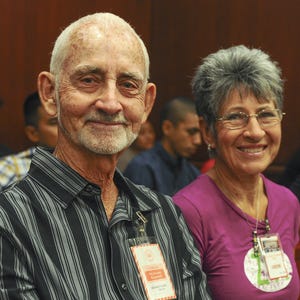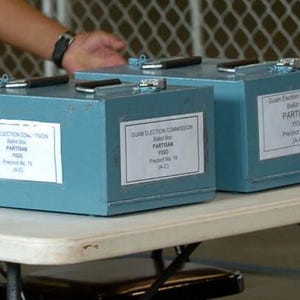New Caledonia’s plebiscite has been about 20 years in the making. The plebiscite was written into the Noumea Accord, a 1998 agreement with France that was the result of years of political unrest and armed conflict.
Guam residents know a thing or two about waiting for such a vote — a vote that could decide the island’s future political status.
“The situation of Guam is replicated across our Pacific Ocean,” said journalist and researcher Nic Maclellan.
Maclellan participated in a forum at the University of Guam on Thursday evening.
The forum was held to update the island on the decolonization efforts in both Guam and New Caledonia. Guam’s plebiscite has been long-delayed for nearly two decades. Gov. Eddie Calvo has previously proposed plans to hold Guam’s plebiscite also by 2018.
Maclellan said he wanted to use New Caledonia as a case study for Guam’s self-determination.
One similarity that the islands share is immigration, Maclellan explained.
Guam has attracted many people from nearby islands who are seeking work and education, he said. Similarly, he explained that New Caledonia has attracted individuals in the French Pacific islands, making it a multi-ethnic society.
Attorney Leevin Camacho also participated in the UOG forum.
(Story continues below.)
An audience member at the forum asked what it would take for Guam’s plebiscite vote to overrule the U.S. Congress’ authority if a referendum does occur. Only Congress has the power to determine Guam’s future political status.
Camacho said it would require international law and international bodies stepping in.
“I refer to Congress as (Guam’s) fourth branch of government,” Camacho said. “They are the highest branch of Guam’s government.”
In terms of turning over court decisions regarding the rights of Guam and other U.S. territories, Camacho said it’s going to take the territory beating the federal government at its own game.
One way, he suggested, was for the local government to pass certain gun legislation that wouldn’t pass in the states.
“Anytime we want to change something we have to run to Congress to change it,” Camacho said. “We can’t do some things on our own the way things stand.”
Unlike the Organic Act of Guam, the Noumea Accord gave New Caledonia more autonomy, creating such institutions as a territorial congress and three provincial assemblies.
New Caledonia’s voting rights also differ greatly from Guam. Although Guamanians are born U.S. citizens, they’re not allowed to vote for president. In New Caledonia, citizens can vote for France’s president, and they also have voting representation in the French Senate and National Assembly.



No comments:
Post a Comment